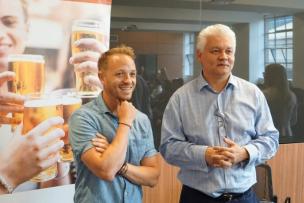The firm’s evolution will pique the interest of anyone hoping to work in consultancy. One of the Big Four professional services firms, KPMG has grown its advisory wing by 105% over the past decade.
Mazhar Hussain, who sits on KPMG’s Digital, Analytics & Innovation UK leadership team, sees much potential in the firm’s digital drive. There is increasingly a need for consultants who understand data and analytics, and who can lead large-scale digital transformations. MBAs too are still hot in demand.
Before joining KPMG, Mazhar was head of client innovation at Deloitte. He also serves as director of the Centre for Advanced Business Analytics at London’s Imperial College Business School.
From which sectors are you seeing the most demand for digital services?
It’s across the board for digital. I don’t think we can dictate where it [demand] is coming from.
Seven years ago the iPhone didn’t exist and we all used Nokia phones. Now, that acceleration is happening at an expedited rate.
Is much of the demand around data and analytics?
Absolutely — that's a huge growth area across all industries and markets and to put it in realistic terms, I think data is almost the currency of the future, which will take shape over the next three-five years.
It’s that data that is helping us shape and develop digital strategies. You wouldn’t be able to establish a digital strategy without data, so data is driving digital.
What are the challenges around businesses using data?
They are really around your own human barriers, around the boundaries you set, and how far you can push them. We are our own worst enemies when it comes to that.
I think there’s huge potential with what you can do with data — now it’s about having the openness and willingness to be able to experiment.
What difficulty have you had attracting consultants with digital expertise?
It’s such diverse skill-sets [that] you need. If you think about what’s going on in the digital market there is a demand for all skills — people who know business and industry, and also this new digital native that can help us explore digital as a business opportunity.
I think there is a shortage of businesses that can attract these skills. The type of people you need to do digital consultancy work are the type of people that aren’t looking for a desk job.
They are looking to work in an office where there is a fun environment or flexible working hours; a more creative environment. I don’t think there’s a shortage of talent, but there is a shortage of places to take digital talent in and give them what they need to develop. We are doing a lot to create an environment for that to flourish.
Consultancy firms have taken different strategies to find these people. Has anyone got the ideal model yet?
There isn’t the right answer right now. Both models [in-house or separate digital brands] work. We’re at an early stage.
It’s also about the people that are buying the services. A business seeking digital services, they are not looking for a consultant wearing a three-piece pinstripe suit and tie. They are looking for a more creative looking person – whatever that means.
Do consultants need cross-functional expertise?
There’s a need to have industry knowledge in specific areas. But also I believe that because digital touches every business you can’t be restricted; there is a more general need for having an overarching view of what’s going on.
Is there a need for more experienced consultants for digital service lines?
Yes there is: there’s a huge demand because the industry is blowing up. It’s growing really quickly [and] we need that talent. We need to have that understanding of the market.
Is there still a demand for MBA educated consultants?
Yeah, absolutely there is. There’s a huge need to bring in that expertise and, like in any industry that is growing, it [consulting] needs every level of talent coming in and helping it to flourish.
Are there concerns that businesses can develop digital strategies in isolation from the rest of their enterprise?
To adopt digital and leverage it and maximize value companies need to be agile and collaborative. They need to be able to learn fast and adapt quickly to what’s going on.
Having a strategy always suggests there is something going in place for three years, but I don’t think you can in digital — things are moving too quickly.
Student Reviews
Imperial Business School
RECAPTHA :
09
3a
09
92








